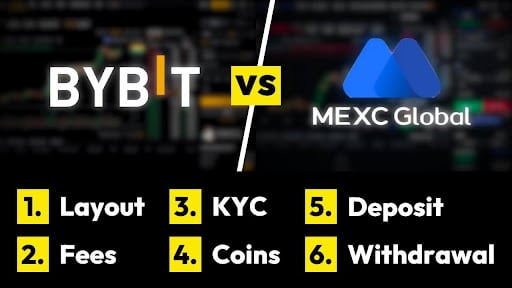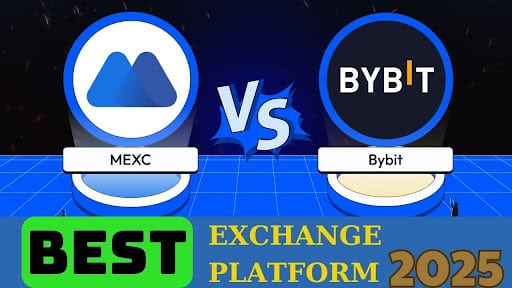Table of Contents
Choosing the right crypto exchange is more than just a preference—it directly affects your risk exposure, trade execution, and potential profits. For traders focused on leveraged and derivatives products, two names usually lead the conversation: MEXC and Bybit.
While both platforms offer advanced features, deep liquidity, and high leverage, they target slightly different types of users. In this guide, we break down each platform’s strengths, weaknesses, fee structures, trading tools, and user experience. By the end, you’ll have a clear idea of which platform better fits your trading style.
Understanding Leveraged and Derivatives Trading
If you’re new to leveraged or derivatives trading, here’s the quick version:
- Leverage lets you control a larger trading position than your initial capital would allow, multiplying both your potential gains and risks.
- Derivatives are financial instruments like futures contracts that let you speculate on cryptocurrency price movements without actually owning the underlying asset.
These tools offer big opportunities but also come with significant risks. That’s why choosing the right platform isn’t just about fees or a pretty interface—it’s about tools, reliability, and risk management.
Platform Background and Market Position
Different exchanges grow with different goals in mind. MEXC and Bybit have carved out unique niches.

MEXC: Built for Growth, Built for Retail
Founded in 2018, MEXC has expanded aggressively, aiming squarely at the retail trading market. Today, MEXC serves over 36 million users across 170+ countries and claims a 13.06% market share in global crypto exchange volume as of 2025.
Why is MEXC growing so fast?
- It offers over 3,000 cryptocurrencies—everything from Bitcoin to obscure meme coins.
- It focuses on emerging markets like Latin America and Southeast Asia.
- It runs regular educational programs and community engagement events.
If you’re someone who likes discovering new tokens early or enjoys trading competitions and giveaways, MEXC clearly appeals to that retail mindset.
Bybit: Focused on Professionals and Institutions
Bybit, also launched in 2018, has taken a different route. While it doesn’t chase the same user volume as MEXC, it focuses instead on professional traders and institutional clients.
With around 350+ listed cryptocurrencies, Bybit is selective about what it offers. Its key strengths are:
- Regulatory compliance: Stricter KYC and AML processes.
- Institutional-grade infrastructure: Faster execution speeds, lower downtime, cleaner UX.
If your priority is trust, compliance, and fewer distractions from speculative tokens, Bybit is designed for you.
Product and Trading Features
Both platforms offer leveraged and derivatives trading, but the breadth and depth vary.
MEXC’s Core Strengths
MEXC leans hard into product diversity:
- Leverage: Up to 500x on USDT-Margined (USDT-M) futures and 200x on Coin-Margined (Coin-M) futures.
- Pairs: Over 600 futures contracts and nearly 3,000 spot trading pairs.
- Tools and UX: Demo trading, copy trading, mobile and web apps, K-line charts, real-time price alerts.
- Unique Features:
- Leveraged ETFs: 3x long/short tokens.
- Staking: APYs up to 70% for MX token holders.
- Launchpad: Access to early-stage token sales through staking.
In short, MEXC feels almost like a crypto supermarket, plenty of choices, some riskier than others. You’ll find popular pairs like SOLUSDT alongside newer tokens, giving both trend followers and early adopters a chance to execute diverse trading strategies.
Bybit’s Core Strengths
Bybit focuses more narrowly:
- Leverage: Generally capped at 100x.
- Perpetual Futures: Main product category, with fewer distractions from altcoins or smaller-cap tokens.
- Clean Interface: Considered one of the most polished and stable trading platforms available.
- Professional Tools: Depth charts, funding rate indicators, multi-account setups for institutions.
While MEXC throws in everything but the kitchen sink, Bybit keeps things streamlined and simple.
Fee Structure Comparison
Costs are especially important in leveraged trading, where margins can be razor-thin. Here’s a head-to-head fee breakdown:
| Fee Type | MEXC | ByBit |
| Spot Maker Fee | 0% | 0.01–0.025% |
| Spot Taker Fee | 0.05% | 0.06–0.075% |
| Futures Maker Fee | 0% | 0.01% |
| Futures Taker Fee | 0.01%–0.02% | Around 0.06% |
Quick takeaway: MEXC’s fee structure is objectively more retail-friendly. Frequent zero-fee promotions and MX token fee discounts sweeten the deal even further. This is especially advantageous for high-volume pairs like BTC/USDT, where tight spreads and low fees can significantly impact net returns.

Security and Asset Protection
In leveraged trading, a system failure or hack can wipe out not just your position but your entire balance. Here’s how each platform handles security.
MEXC Security Highlights
- Bi-monthly Proof of Reserves: Regular third-party audits confirm 100%+ reserve ratios.
- Cold Wallet Storage: 95% of funds held in multisig cold wallets.
- AI-Driven Monitoring: Detects suspicious activities in real time.
- Insurance Fund: $526 million pool covering liquidation risks.
Bybit Security Highlights
- Regulatory Compliance: Strict KYC and AML enforcement.
- Cold Wallet Storage: Institutional-grade asset storage.
- Focus on Trust: Bybit’s core value is building user confidence through transparency and reliability.
For institutional users or very high-net-worth traders, Bybit might feel safer. For active retail traders looking for transparent audit reports, MEXC offers solid protection.
Community and User Engagement
A surprisingly important factor for many traders is how involved they feel in a platform’s community.
MEXC: Retail Engagement First
MEXC runs a full calendar of retail-focused initiatives:
- Airdrop Season: Quarterly rewards distribution.
- IgniteX Program: Blockchain education programs.
- Competitions: Trading contests with prize pools up to $30 million.
- Startup Ecosystem Funding: $300 million development fund for Web3 startups.
Bybit: Quiet But Reliable
Bybit doesn’t push community engagement as aggressively. Its primary focus remains on keeping its platform professional and secure. It does run occasional contests but nothing as consistent or retail-focused as MEXC.
Final Verdict: MEXC or Bybit?
Both platforms excel in leveraged and derivatives trading but for very different audiences.
- Choose MEXC if you want variety, low fees, and don’t mind higher risks for bigger rewards.
- Choose Bybit if you prefer safety, fewer distractions, and a more controlled trading environment.
If you’re an experienced retail trader looking for opportunities in emerging tokens, MEXC is likely a better fit. If you’re managing larger sums and need regulatory backing, Bybit makes more sense.
Conclusion
Both MEXC and Bybit offer solid options for crypto traders interested in leverage and derivatives, but they serve different kinds of users. MEXC appeals more to retail traders looking for a wide variety of coins, higher leverage options, and lower fees. It’s especially popular among those who like exploring smaller or newer cryptocurrencies.
Bybit, on the other hand, keeps things tighter and more regulated. It may not offer as many tokens or community events, but it makes up for that with a focus on stability, compliance, and professional-grade features.
In the end, it comes down to your trading style. If you want variety and community-driven features, MEXC is a strong choice. If you’re after simplicity, trust, and cleaner execution, Bybit might be the better fit.
